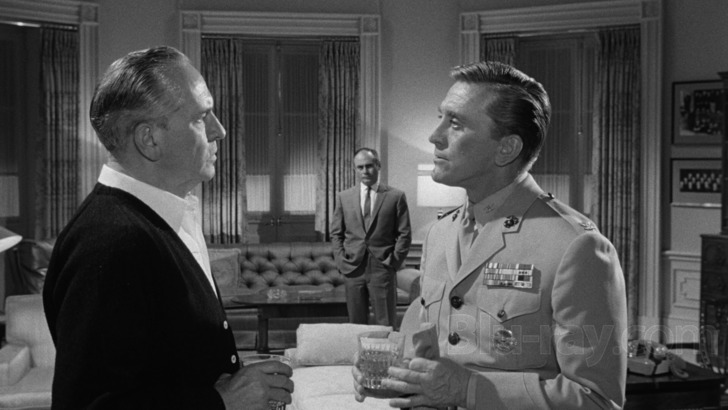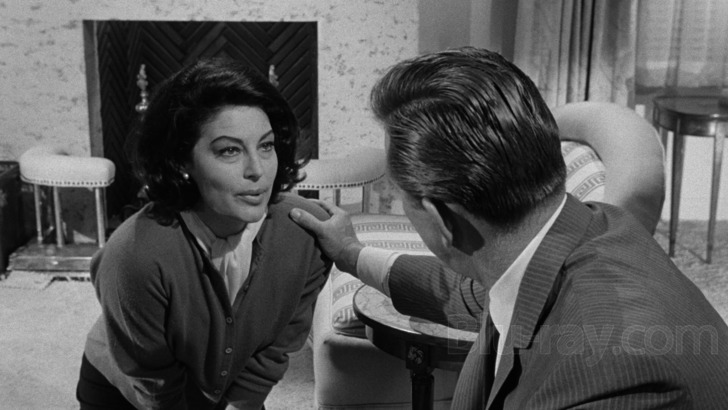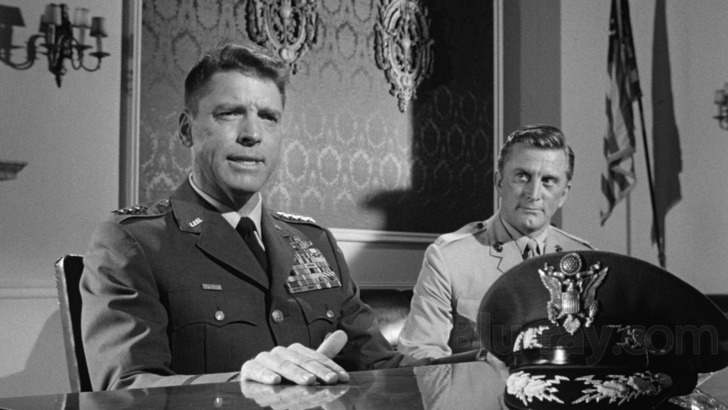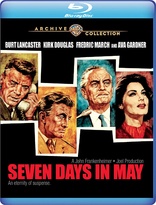Seven Days in May Blu-ray Movie
HomeSeven Days in May Blu-ray Movie 
Warner Archive CollectionWarner Bros. | 1964 | 118 min | Not rated | May 02, 2017
Movie rating
7.9 | / 10 |
Blu-ray rating
| Users | 0.0 | |
| Reviewer | 4.5 | |
| Overall | 4.5 |
Overview
Seven Days in May (1964)
It happens with a startling swiftness and violence. An armed cadre seizes state control. Fortunately, a coup d'état can't happen here. Or can it?
Starring: Burt Lancaster, Kirk Douglas, Fredric March, Ava Gardner (I), Edmond O'BrienDirector: John Frankenheimer
| Thriller | Insignificant |
| Drama | Insignificant |
| Romance | Insignificant |
Specifications
Video
Video codec: MPEG-4 AVC
Video resolution: 1080p
Aspect ratio: 1.78:1
Original aspect ratio: 1.85:1
Audio
English: DTS-HD Master Audio 2.0 Mono (48kHz, 24-bit)
Subtitles
English SDH
Discs
Blu-ray Disc
Single disc (1 BD)
Playback
Region free
Review
Rating summary
| Movie | 5.0 | |
| Video | 4.5 | |
| Audio | 4.0 | |
| Extras | 2.5 | |
| Overall | 4.5 |
Seven Days in May Blu-ray Movie Review
Patriots
Reviewed by Michael Reuben May 7, 2017The paranoid political thriller thrived in Seventies cinema, but two classics of the genre appeared during the Kennedy administration a decade earlier, and both were made by the same director. John Frankenheimer's The Manchurian Candidate was released in 1962, and its durability has made the title a pop culture and political catchphrase. But Frankenheimer wasn't done. The following year, he directed Seven Days in May, which was released in February 1964. Though the two films have much in common, including the editing genius of Ferris Webster, Seven Days differs from Frankenheimer's earlier film in critical respects. It lacks a high-concept device comparable to the post-hypnotic brainwashing of The Manchurian Candidate, and it doesn't have a foreign enemy pulling strings from afar as a readily identifiable villain. In Seven Days, the attack on America comes from within, and Frankenheimer's challenge was to build an onscreen world in which that threat would seem credible. He succeeded so effectively that Seven Days has been chilling audiences ever since, even as numerous elements of the film have dated, from its technology to the pervasive cigarette smoking. Scripted by Rod Serling from a novel that Frankenheimer didn't know would become a bestseller when he and star Kirk Douglas acquired the rights, Seven Days stands as a nagging reminder that democracy is a fragile thing.

Seven Days is set at an indefinite date after 1964, when U.S. President Jordan Lyman (Fredric March) is on the verge of signing a nuclear disarmament treaty with the Soviet Union. The country is bitterly divided over the wisdom of the treaty. In the film's opening sequence, demonstrators clash in front of the White House, in a documentary-style sequence that would become all too familiar on the evening news in the years to come. (It was President Kennedy, an admirer of The Manchurian Candidate, who facilitated the necessary permissions for Frankenheimer and his crew to shoot crowd scenes in the real location; the President even vacated the White House during filming to ease security concerns.) Chief among the treaty's opponents is Gen. James Mattoon Scott (Burt Lancaster), Chairman of the Joint Chiefs, whose popularity already has him positioned for a presidential run in the next election.
But Gen. Scott doesn't intend to wait that long. He believes that the U.S. cannot survive without its nuclear capability, and he has engineered a bold plan to prevent the disarmament treaty from ever being signed. Scott's scheme involves a secret base of specially trained troops, seizure of the nation's communications centers, and a declaration of martial law. Key members of Congress and the press have been enlisted in the general's cause, and an "alert" exercise scheduled for May 18 has been designed as a cover for a swift and bloodless coup that will remove President Lyman and the rest of the civilian authority.
Seven days before Scott's operation, however, his chief assistant, Col. Martin "Jiggs" Casey (Douglas), becomes suspicious. He spots anomalies in the preparations for the upcoming exercise. A betting pool sent through coded channels to a specific set of individuals seems to be about more than just a horse race. A chance encounter with an old Army friend alerts Jiggs to a military division designated as "EComCon" that has been erased from all official records but is currently preparing for deployment. Faced with the prospect that his commanding officer may be about to subvert the very Constitution he swore to defend, Jiggs is torn by competing loyalties between the commander he admires and the country he serves. Eventually, he finds himself in the White House, reluctantly detailing his concerns to a skeptical President Lyman and his closest advisors.
Kirk Douglas famously regretted taking the role of Jiggs, while allowing his friend, Burt Lancaster, whom Douglas insisted that Frankenheimer cast, to play the villain of Seven Days. Certainly Gen. Scott is the flashier role, and Lancaster brings conviction and star power to the general's sense of his own destiny, especially in the climactic confrontation with President Lyman, which Frankenheimer would later say was the best scene he ever directed. But Douglas' understated performance is equally impressive. His face reveals Jiggs's growing anguish as he realizes what his superior officer is planning, and his halting delivery when Jiggs relates his concerns to the President eloquently bespeaks his inner doubts. Later, when Jiggs is tasked with extracting potential blackmail material from the general's former girlfriend, Eleanor Holbrook (Ava Gardner), who has opened her heart to him in the hope that he'll respond, Douglas' face is a study in conflicted emotion. Douglas may not have the grand speeches reserved for Lancaster's general or March's President, but he does get to deliver the film's ultimate indictment of Gen. Scott in a final, damning line, and he makes the most of it.
The supporting players are just as good as the leads. As Frankenheimer repeatedly notes in his commentary, he had worked with many of them before and knew their capabilities. The reliable Martin Balsam plays Paul Girard, the President's top advisor, and Edmund O'Brien, who was nominated for an Oscar for his work, portrays the hard-drinking Senator Raymond Clark of South Carolina, who is the President's chief legislative ally. Both are deployed on important missions for the President after he learns of Gen. Scott's plan, and both meet with resistance and opposition (with radically varying results). The imposing John Houseman appears (uncredited) as Vice-Adm. Barnswell, a key military player whose loyalties appear to be determined by a canny survivor's instinct. A bevy of familiar faces from Frankenheimer's days of directing TV fills out the cast.
Frankenheimer's direction of Seven Days is a master class in the use of framing and focal lengths to create tension and suspense while juggling a large cast effectively. He frames faces at varying distances and often shoots from below to create a subtly distorted perspective, and he uses deep focus to include background actors in the scene, even while an intense conversation occupies the foreground. Most directors would cut back and forth, but Frankenheimer's approach is more quietly revealing, especially on multiple viewings. Editor Ferris Webster reuses and refines some of the unsettling rhythms he created for The Manchurian Candidate. Look, for example, at the sequence where Jiggs watches Gen. Scott deliver a televised address, with a growing sense of unease as the general's fiery rhetoric seems to confirm all the clues pointing to his covert actions. The edits display the same abrupt timing and unsettling closeups used in The Manchurian Candidate when Dr. Yen Lo demonstrates his control over the brainwashed American G.I.s.
Seven Days in May Blu-ray Movie, Video Quality 

Seven Days in May was shot by Ellsworth Fredericks (Invasion of the Body Snatchers). As Frankenheimer notes in his commentary, he preferred black-and-white photography, which he found to be more expressive (and, in his color movies, he often used desaturation to bring the imagery closer to B&W). The source for this 1080p, AVC-encoded Blu-ray from the Warner Archive Collection is a fine-grain master positive made from the original camera negative for preservation purposes. The fine-grain was scanned at 2K by Warner's Motion Picture Imaging facility, followed by appropriate color-correction and cleanup. The result is an image of exceptional clarity and fine detail. Solid blacks and accurately rendered grays impart depth and texture to the film's re-creations of interiors at the White House and the Pentagon, as well as more exotic locations like an aircraft carrier below decks and a country field strewn with wreckage. The quality of the image allows full appreciation of Frankenheimer's careful arrangement of figures in deep-focus frames, with action occurring both immediately in front of the camera and in the far distance. Aliasing, distortion and other interference are wholly absent, and the film's grain pattern is finely and naturally rendered. Detail and grain resolution are slightly reduced during scenes involving dissolves, but this is an inescapable side effect of an optically achieved dissolve, and it's minor. WAC has mastered Seven Days at its usual high average bitrate, here 34.99 Mbps.
Seven Days in May Blu-ray Movie, Audio Quality 

Seven Days' original mono track has been derived from the magnetic production master, cleaned of any damage or distortion and encoded on Blu-ray in lossless DTS-HD MA 2.0. It's a quietly efficient mix that emphasizes dialogue, with occasional attention-grabbing effects like the rain that is pouring down when Jiggs drives to Gen. Scott's home for a meeting that never happens. The voices are all clearly rendered, and the sparely used score by Jerry Goldsmith plays with good fidelity and adequate dynamic range. (Goldsmith was called in after Frankenheimer and his producer rejected the score tendered by Manchurian Candidate composer David Amram.)
Seven Days in May Blu-ray Movie, Special Features and Extras 

The extras have been ported over from Warner's 2000 DVD of Seven Days in May. The trailer
has been remastered in 1080p.
- Commentary with Director John Frankenheimer: Recorded in 1999, the director provides a wealth of detail about the production, identifying locations, pointing out shot compositions, background details and nuances of performance, describing rehearsals and identifying a brief reshoot in France while he was making The Train, when a decision was made to change the ending. Frankenheimer also offers thoughtful reflections on the film's themes in the context of the early Sixties and repeatedly wonders whether anything like Seven Days could be made "today" (which, in context, means the final years of the last millennium).
- Theatrical Trailer (1080p; 1.78:1; 3:45): The trailer is unusually long and detailed. "There are some who will say it can never happen here. But this is the story of how it could happen."
Seven Days in May Blu-ray Movie, Overall Score and Recommendation 

In his commentary, Frankenheimer points out elements in Seven Days' production design that
were intended to situate the story in a future time, including making all of the cars foreign
imports that didn't resemble what was then typical on American roads and the recurrent use of
video-conferencing, a prescient notion that didn't yet exist. Today, none of these devices have the
same effect, but perhaps what most "dates" Seven Days is its ability to unsettle the viewer
without recourse to gunfire, explosions or violence. (What bloodshed does occurs happens
offscreen.) For all of the military might hovering around the edges of the story, Frankenheimer
achieves his impact through traditional dramatic means, in tense consultations and arguments
where the actors' conviction conveys the enormity of the stakes. Highly recommended.
Similar titles
Similar titles you might also like

Twilight's Last Gleaming
Nuclear Countdown
1977

Fail Safe
1964

The Internecine Project
1974

The President's Analyst
Special Edition
1967

Topaz 4K
1969

The Ugly American
1963

Hidden Agenda
1990

Jet Pilot
1957

The Manchurian Candidate 4K
1962

Eye in the Sky
2015

Good Kill
2014

The Day After
1983

Dr. Strangelove or: How I Learned to Stop Worrying and Love the Bomb
1964

Suddenly
1954

The Satan Bug
1965

Salvador
1986

Billion Dollar Brain
1967

The Ipcress File
1965

Red Joan
2018

Child 44
2014
